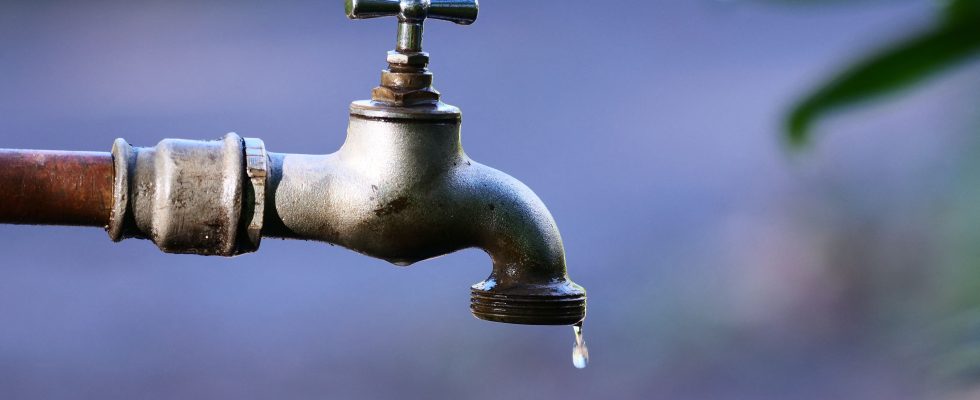“The world has just had its warmest start to June on record, after a month of May very close – just 0.1°C – to the temperature record set”, recently explained the scientists of the Copernicus service on climate change (C3S). Will the thermometer also panic during the summer, causing strong tensions on water resources? L’Express reviews three possible black scenarios: the first on the water supply of small towns, the second on the excessive heating of rivers and the last on the drying up of crops.
In Bargemon, in the Var, a few kilometers from Fréjus, Christophe Sarkissian is cautious. “For the moment, we have no worries thanks to the rains in May, but we remain attentive: the population should almost double from the holidays and this puts us in a critical position regarding drinking water.” The first deputy of this village of less than 1,500 inhabitants, which presents itself as the “pearl of the Haut Var”, details his battle plan. “We have planned a container and a stock of water bottles, but without distribution for the moment, we know that the levels are tense: last year, from July 3, we were in difficulty.
Like Bargemon, many small villages in France live with anguish as the summer season approaches. It must be said that in 2022, a year marked by a record drought, 2,000 municipalities had found themselves faced with interruptions in the drinking water supply, sometimes forcing the mayors of these isolated localities to mobilize tank trucks to ensure the ‘supply.
Seven to eight daily trips
A ballet of vehicles that we could well see again this summer on the roads. Admittedly, after a particularly worrying and unprecedented winter due to its lack of precipitation, part of France was able to benefit from significant rains. But some regions still stick out their tongues. “66% of groundwater levels remain below monthly normals in May with many sectors showing low to very low levels,” noted the Bureau of Geological and Mining Research (BRGM) in mid-June. While the rains in May had an impact in the west and center of France, they remained relatively insufficient in the south and around the Mediterranean. “These are mainly thunderstorms, therefore this may have moistened certain soils and greened the vegetation, but most did not recharge the water tables”, explained Violaine Bault, hydrogeologist at BRGM.
In some municipalities, where last year’s supply difficulties have still not been resolved, the situation is becoming particularly tense. In Seillans (Var), Mayor René Ugo does not hide his concern. Since last summer, and almost continuously, his municipality has been supplied by tank trucks to provide drinking water to 350 users. “We make seven to eight trips a day from a water point located next to the town,” he explains. The fault lies with springs that dried up as the droughts progressed, as well as a faulty network waiting to be repaired. “We should get power next year from another source. The work is scheduled but it remains conditional on obtaining a grant from the Water Agency,” explains the city councilor.
Boreholes that stall
In March, as part of its announcements on water, the government had identified a list of 170 “black spots”. Villages where leaks in the networks could reach 1 liter out of 2, requiring urgent work. Since then, an annual aid envelope of 180 million euros has been released. “We are in the process of compiling the data, but we know that in these municipalities, work is being carried out at this very moment to secure and improve access to drinking water”, explains the Ministry of Transition. ecological.
Insufficient, however, to avoid tensions in certain parts of the country. At the Adour-Garonne Water Agency, whose basin extends from Charente-Maritime to Ariège, there are about fifteen municipalities in difficulty, including three that have already resorted to to the “citernage”. “Small catchments are drying up, and while waiting to find an emergency interconnection, these municipalities can resort to water deliveries by truck, or bottle distributions”, recognizes Lauriane Boulp, in charge of drinking water missions. In the absence of permanent solutions, the files for these security works are multiplying, accumulating 600,000 euros in funding.
In these territories where the water supply remains on the wire, the authorities come to scan the sky. “Three weeks without rain and we immediately have boreholes that drop out and communities in difficulty”, deplores Christelle Sgard, head of the environmental service at the Departmental Directorate of the territories of Corrèze. The glimmer of hope? There is no shortage of solutions: beyond new boreholes, France can strengthen the interconnections between networks, or even reuse treated wastewater… But to restore confidence in the municipalities most affected and avoid new breaking points, we must now go faster.
